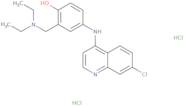Información del producto
- 7-Chloro-4-(3'-diethylaminomethyl-4'-hydroxyanilino)quinoline dihydrochloride
- 4-(7-Chloro-4-quinolylamino)-α-(diethylamino)-o-cresol dihydrochloride
- 7-Chloro-4-(3′-diethylaminomethyl-4′-hydroxyanilino)quinoline dihydrochloride
- Acrichin dihydrochloride
- Amodiaquin dihydrochloride
- Amodiaquine dihydrochloride
- Basoquine
- Camoquin hydrochloride
- Phenol, 4-[(7-chloro-4-quinolinyl)amino]-2-[(diethylamino)methyl]-, dihydrochloride
- Phenol, 4-[(7-chloro-4-quinolinyl)amino]-2-[(diethylamino)methyl]-, hydrochloride (1:2)
- Ver más sinónimos
- o-Cresol, 4-[(7-chloro-4-quinolyl)amino]-α-(diethylamino)-, dihydrochloride
Amodiaquine is a drug that is used to treat malaria. It can be given by mouth or intravenously and is usually taken with artesunate. Amodiaquine has been shown to have a toxic effect on the skin, which may be due to its ability to inhibit polymerase chain reactions in cells. Amodiaquine also has an effect on the heart and blood vessels, which may be due to its ability to block ion channels. Amodiaquine may also have hypoglycemic effects, which are caused by inhibition of gluconeogenesis in the liver. The increased concentrations of amodiaquine in the liver result in decreased glucose production and increased insulin sensitivity. This drug also has anti-inflammatory properties and can decrease levels of pro-inflammatory cytokines such as IL-6, IL-8, and TNF-α.





